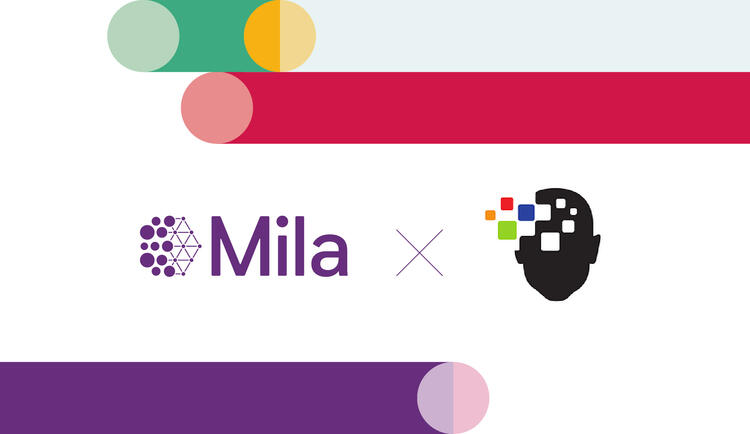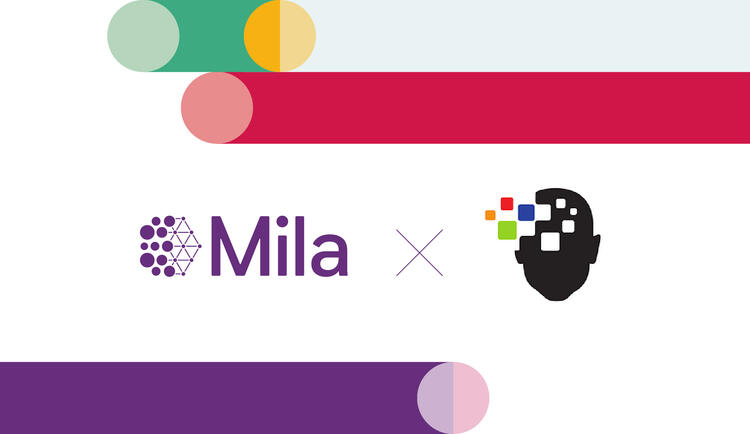
Mila News︱Stéphane Létourneau
At Mila, a significant number of researchers have ongoing research projects tackling some of healthcare’s most pressing problems—developing AI and machine learning tools aimed at contributing to the fight against the current pandemic and other important areas of life sciences, such as oncology, drug discovery and neuroscience. As part of this work, Mila extends its expertise and AI leadership to large-scale interdisciplinary initiatives with the goal of bringing viable solutions to healthcare for the benefit of all.
The data deluge in biology and medicine is accelerating an AI healthcare revolution. As a society, we have generated more data in the last few years than in the entire previous history of society. This phenomenon is what historian Yuval Noah Harari calls the “twin revolutions in information technology and biotechnology” in his book, 21 Lessons for the 21st Century. With the volume of medical data in the world increasing at a rapid pace and at a time when our healthcare systems are overburdened in the pandemic’s wake, machine learning and AI applications have the potential to revolutionize how therapies are discovered and healthcare is delivered.
The global response to COVID-19 has led to unprecedented interdisciplinary collaborations between governments, industry, healthcare providers, and researchers across fields. At the intersection of AI and COVID-19, experts have been devoting their time and energy to reduce the disease’s spread, improve patient care, accelerate drug discovery, develop effective vaccines and reduce the quarantine impact on citizens. If nothing else, COVID-19 has revealed that many of our shared challenges call for AI. Although it is an emerging technology still in the rapid and early growth stages, it is already a robust tool that can serve the global common good.
AI for Health Initiatives
This sense of urgency and solidarity is unquestionable. At Mila and elsewhere, researchers have been rolling up their sleeves to help fight the virus, putting aside other projects to work for the scientific and medical communities. Yet even prior to the pandemic, Canada has been in the vanguard of health and AI innovation, establishing consortiums and think tanks that allow leading AI experts to contribute to the broader social dialogue. In Quebec alone exist numerous homegrown initiatives that seek Mila’s scientific leadership, including:
- Université de Montréal’s Digital Health Consortium: Created in 2019, the Consortium brings together the university’s entire digital health ecosystem (faculty, university hospitals, affiliated departments) along with organizations such as Mila and IVADO. The Consortium fosters links with external stakeholders and seeks to better support, coordinate and plan research and training throughout the Université de Montréal network engaged in the field of digital health. The Consortium aims to equip itself with tools that facilitate the development of partnerships at the interface of data science, machine learning, and health-related fields in support of the regulatory and public policy aspects that shape the healthcare system. The founding principles underlying the work of the consortium are driven by the Montreal Declaration for the Responsible Development of Artificial Intelligence.
- The Digital Health & Discovery Platform (DHDP): The DHDP is a pan-Canadian initiative co-led by the Terry Fox Research Institute and Imagia, with support from Canada’s three leading AI research institutes (Mila, Vector Institute, and Amii). DHDP is focused on improving health outcomes for Canadians and advancing precision medicine technologies.
- Génome Québec’s Roundtable for Precision Medicine: In September 2020, Génome Québec announced the creation of the Table de concertation en médecine de précision following the dissolution of the Quebec Network for Personalized Health Care (QNPHC). The roundtable aims to consolidate Quebec’s expertise in genomics, artificial intelligence and medicinal chemistry in order to maintain the province’s leadership at the forefront of research in precision medicine.
- The Advisory Committee on Connected Health: Initiated by Numana (formerly TechnoMontréal) as part of their think tank Humanitek, the goal of this advisory committee is to facilitate and develop opportunities for research, industrial collaboration, and projects within the health and wellness ecosystems dedicated to aging populations.
- Montreal InVivo’s Strategic Committee on AI in Quebec’s life sciences and health technologies sector: The Committee’s mandate is to promote the development of an AI-powered life sciences and health technologies sector using AI in various stages of the innovation cycle, from diagnosis to therapy, to health prevention and management of care administration.
- The International Observatory on the Societal Impacts of AI and Technology (OBVIA): Based out of Université Laval and supported by the Fonds de recherche du Québec, and in partnership with the ministère de l’Économie et de l’Innovation, OBVIA is a democratic open research network bringing together nearly 20 universities and over 200 researchers from humanities and social sciences, sciences and engineering, and health. Members of OBVIA’s Sustainable Health research team are focusing on the development of responsible AI and data governance for earlier diagnoses and precision medicine.
Thanks to these initiatives and many more that strengthen and promote the growth of the AI ecosystem in Quebec and across Canada, several projects supported by multi-stakeholder partnerships under the PPP formula show great promise, for instance:
- Quebec Smart Care Consortium: The Smart Care Consortium being formed by the Research Institute of the McGill University Health Centre and partners, wants patients to be at the heart of their data to ultimately transform Quebec’s healthcare system into a more efficient and accurate patient-centered system.
- Chloe, a COVID-19 Q&A Chatbot: Mila, along with many other collaborators, teamed up with Dialogue—one of the leading telemedicine providers in Canada and globally—to create Chloe, an AI-powered question and answering system. The goal is to reduce the high call volumes to government helplines while providing virtual support to Canadians with current and verified information about COVID-19.
The Mila Ecosystem
To date, Mila brings together nearly 30 world-renowned university professors from Université de Montréal, McGill University, HEC Montréal, Polytechnique Montréal, and several other academic institutions whose research interests are at the interface of AI, health, and life sciences, ranging from bioinformatics and medical machine learning to neuroscience and oncology.
Many COVID-19 related projects are underway, including promising research advances in drug discovery and understanding disease progression:
- RECOVER Coalition: Mila has been closely collaborating with Relation Therapeutics for the identification of drug repurposing combinations as potential therapeutic candidates for COVID-19. The Mila and Relation Therapeutics teams, with funding from the Bill and Melinda Gates Foundation, developed the RECOVER coalition, a repository to explore the space of drug combinations to discover synergistic drugs using active learning. Their latest findings, which were recently made publicly available, were conducted using simulations on historical oncology data. Their results suggest that a 10-fold improvement in the speed at which best drug combinations are found is possible.
- CRISPR-based genetic screens to identify new drug targets: as part of the COVID-19 regional health initiative launched by Génome Québec, this project is led by Mike Tyers of IRIC, with close collaboration from Mila Scientific Director Yoshua Bengio and Anne Marinier of IRIC and the Université de Montréal. The team is using CRISPR-based genetic screens, combined with AI, to identify new drug targets to predict chemical inhibitors against these targets, and advanced medicinal chemistry to synthesize and test inhibitors of the SARS-CoV-2 virus lifecycle.
- COVIDB: A multidisciplinary project spearheaded by Dr. Michaël Chassé of the Centre hospitalier de l’Université de Montréal (CHUM) has led to the development of a multimedia database of patients with suspected or confirmed COVID-19 in order to develop and validate machine learning tools to improve prediction and decision models for clinical care of COVID-19 patients. The data under study is currently being analyzed by Mila Principal Investigators Joëlle Pineau and David Buckeridge of McGill University, and Audrey Durand of Université Laval. With this biobank, the team aims to develop a method that can combine observational and experimental data to predict the effects of different hospital resource allocation strategies on different groups of COVID-19 patients.
- COVID-19 genomics taskforce: In order to better understand COVID-19 disease progression, the genomics taskforce, co-led by Guy Wolf, Mila Core Academic Member and UdeM Assistant Professor, Smita Krishnaswamy (Yale), Julie Hussin of the Montreal Heart Institute and UdeM, as well as Martin Smith and Morgan Craig (both from UdeM and the Centre hospitalier universitaire de Sainte-Justine), developed Multiscale PHATE. Their latest findings, enabled by this new multiresolution visualization method, indicate interesting patterns that may form disease signatures and predict patient outcomes. Follow up work is currently being conducted in collaboration with Dr. Julie Hussin to analyze inter- and intra-host genetic variations of SARS-CoV-2, and further interdisciplinary work is planned with researchers from the CHUSJ and CHUM.
To learn more about collaboration opportunities, contact us at partnerships@mila.quebec.
For more information: medias@mila.quebec.




